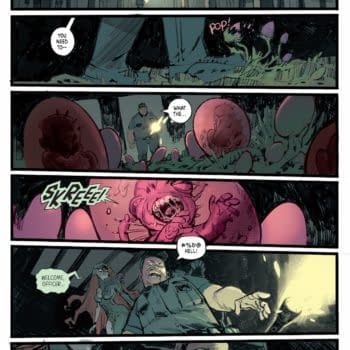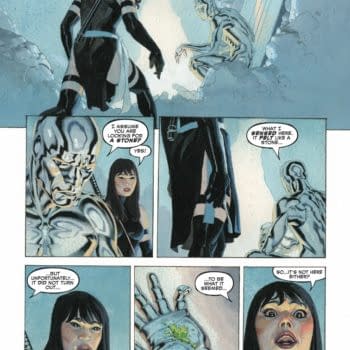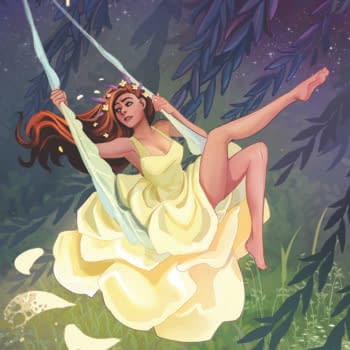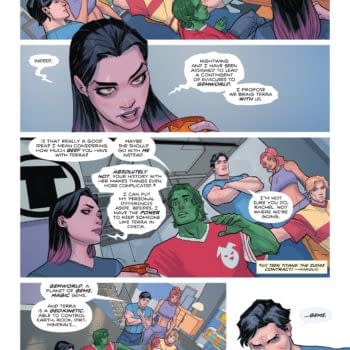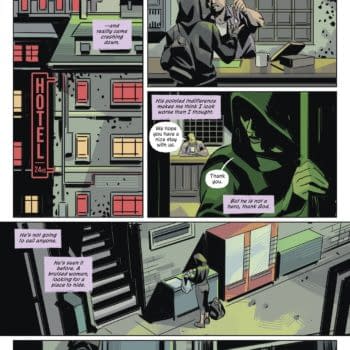Posted in: Comics | Tagged: Comics, dynamite, entertainment, King Features, Mandrake the Magician, roger langridge
"I'm A Newspaper Strip Fan From Way Back" – Roger Langridge Talks Mandrake The Magician

BYRON BREWER: Roger, how does it feel to be part of such an important event as the 100th anniversary of King Feature Syndicate, and seeing all these iconic characters coming together?
ROGER LANGRIDGE: I was not aware that it was the 100th anniversary, but I think they should have taken it further and stuck Popeye and Snuffy Smith in there as well! I'm a newspaper strip fan from way back – The Smithsonian Book of Newspaper Comics is a formative influence on my cartooning aesthetic – so it's a privilege to be a part of such an event.
BB: How did you become part of the Mandrake mini-series?
RL: Editor Nate Cosby was kind enough to ask me. I was happy to do it, partly because it's Nate, who I like working with, and partly because my mother used to collect Mandrake in scrapbooks for me when I was little, and I think she would have liked that I went on to write his adventures.
BB: For the uninitiated, tell us about your interpretation of Mandrake and how he differs from other magic-oriented characters like Doctor Spektrum, Zatanna and Doctor Strange.
RL: Mandrake's forté has traditionally been more hypnosis and illusion, not sorcery as such, unlike those other characters you mention. The way I'm playing it is that he knows more magic than he lets on, and there are reasons he doesn't use it, some of which we'll find out during this story (and maybe we'll even see his resolve crack a little, as he finds he has to use a bit of real magic despite his misgivings). The biggest difference for me, though, is his relationship with his colleague Lothar, which is the rock the strip is built on as far as I'm concerned. He's not a loner. He's a performer; he's charismatic and charming. He has friends, some of whom, like Lothar, have known him longer than any of us have been alive. Those relationships set him apart from his imitators, who tend by and large not to be social creatures.
BB: Tell us about the storyline of this mini-series.
RL: We pick things up after the events of Kings Watch earlier this year, when Ming the Merciless and his hordes attempted to invade the Earth. Post-invasion, the world's technology is fried, the political landscape is unstable, and Mandrake's wife Narda is the new head of COBRA, Mandrake's oldest enemies. So our story begins with Mandrake trying to sort out some of the mess, but things get complicated when his magical collection at Xanadu is burgled and terrible forces are unleashed. With Lothar off being The Phantom for a bit, it's down to Mandrake and Lothar's witch girlfriend, Karma, to deal with Narda's plans … and, shall we say, added occult complications? Anyway, things get a bit hairy.
BB: Can you tell us a little about the big-bad(s) of the story?
RL: There are two villains, really, though they're connected. Firstly there's Narda: she's been through some things that have changed her and she's become quite ruthless. Already the ruler of the kingdom of Cockaigne, she wants the rest of the world as well. And then there's the demon-creature Mandrake was talking to in Kings Watch #1, with whom Narda and Mandrake have some history, and whose power and generally sinister presence become more and more important as the series progresses.
BB: Is a character like Mandrake harder to write than you general action hero like Flash Gordon or Phantom, and why?
RL: Personally, I find Mandrake easier to write than an out-and-out superhero. As a cartoonist, I find a character whose main passion in life is to perform and entertain much more relatable than someone who wants to fight evil. Mandrake tends not to seek out wrongdoers so much as he gets caught up in events and has to make the best job of it that he can … which sounds much more like life as I understand it. To be honest, the hardest thing about writing Mandrake was that I couldn't use Lothar very much, due to him being busy elsewhere while this series takes place … although I've made him as much of a presence as I could get away with, because Mandrake without Lothar doesn't really work. Any great character is only as good as their supporting cast!
BB: What is it like working with artist Jeremy Treece?
RL: So far I've only seen a few pages, but I'm liking it a whole lot. Jeremy's style is very different from any previous interpretation of Mandrake, in a good way: he brings a modern flair to things, a bit of a Tim Burton aesthetic, which works amazingly well for a magical character. I'm really looking forward to seeing where he takes it.
BB: These King minis are to dovetail in May in a cross-over. Can you tell us anything about that?
RL: Not a whole lot. I had some boundaries to work within: characters who had to be over here or over here, or who I couldn't use because he was over there, or situations left over from Kings Watch that had to be addressed but not resolved entirely because that was coming later, and something that had to be set up by the end of the series for another character to pick up and run with … all of which was a new way of working for me; I've never been involved in a comic book "event" before. But where any of that is leading I couldn't tell you. I'll be as surprised as anyone else when I eventually read it!









